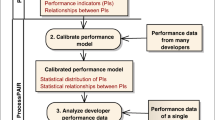Abstract
Software quality is one of the important elements of project management. Software review is one of the most cost effective techniques for detect and remove defects for improving software quality during software development life cycle. Literature suggests that experience and training have positive effect on software review performance. However, there is no empirical study conducted to analysis the important relationships between, experience, training and performance. A laboratory study was conducted with 192 volunteer university students to examining the above relationships in a software review task. The results suggests that (1) there is positive relationships between role experience and performance, (2) training has no impact on performance, (3) working experience has an positive effect on performance (4) working experience has an impact and (5) role experience has no impact on performance.




Similar content being viewed by others
Explore related subjects
Discover the latest articles, news and stories from top researchers in related subjects.References
Ackerman FA, Buchwald LS, Lewski FH (1989) Software inspection: an effective verification process. IEEE Softw 6(3): 31–36
Boehm BW, Basili BR (2001) Software defect reduction top 10 list. IEEE Comput 34(1):135–137
Brodbeck FC, Greitemeyer T (2000) Effects of individual versus mixed individual and group experience in rule induction on group member learning and group performance. J Exp Soc Psychol 36(6):621–648
Campbell JP (1990) Modelling the performance prediction problem in industrial and organizational psychology. In: Dunnette MD, Hough LM (eds) Handbook of industrial and organizational psychology, 2nd edn. Consulting Psychologists Press Inc., Palo Alto, pp 87–732
Carli LL (1989) Gender differences in interaction style and influence. J Pers Soc Psychol 56:565–576
Cronbach LJ, Show RE (1977) Aptitudes and instructional methods: a handbook for research on interactions. Irvington, New York
Czaja SJ, Sharit J, Ownby R (2001) Examining age differences in performance of a complex information search and retrieval task. Psychol Aging 16(4):564–579
Doolan EP (1992) Experience with Fagan’s Inspection Method. Software-Practice Experience. IEEE Software 22(3):173–182
Fagan ME (1976) Design and code inspections to reduce errors in program development. IBM Syst J 15(3):182–211
Fagan ME (1986) Advances in software inspections. IEEE Trans Softw Eng 12(7):744–751
Fowler PJ (1986) In-process inspection software products at AT&T. AT&T Tech J 65(2):744–751
Gilb T, Graham D (1993) Software inspection. Addison Wesley Publishing Company, Reading
Gless RL (1999) Evolving a new theory of project success. Commun ACM 45(11):7
Hacker ME, Kleiner BM (1999) A study of the effects of procedural structure and anonymity on process improvement work groups. Eng Manage J 11(4):26–30
Harmon J, Schneer JA, Hoffman LR (1995) Electronic meeting and established decision groups: audio conferencing effects on performance and structural stability. Organ Behav Hum Decis Process 61(2):138–147
Herold DM (1979) The effectiveness of work groups. In: Kerr S (ed) Organizational behavior. Grid Publishing, Columbus. Reprinted in Nadler DA, Tushman ML, Hatvany ND (eds) (1982) Managing organizations: readings and cases. Little Brown, Boston
Hollenbeck JR, Ilgen DR, LePine JA, Colquitt JA, Hedlund J (1998) Extending the multilevel theory of team decision making: effects of feedback and experience in hierarchical teams. Acad Manage J 41(3):269–282
Holton EF (1996) The flawed four level evaluation model. Hum Resour Dev Q 7(1):5–21
Kim PH (1997) When, What You Know Can Hurt You: A Study of Experiential Effects on Group Discussion and Performance. Organ Behav Hum Decis Process 69(2):165–177
Kirkatrick D (1993) Making it all worker-friendly. Fortune 128(7):44–53
Kirkpatrick DL (1967) Evaluation of training. In: Craig RL, Bittel LR (eds) Training and development handbook. McGraw-Hill, New York, pp 87–112
Korman AK (1977) Organizational behavior. Prentice Hall, Englewood Cliffs
Littlepage G, Robison W, Reddington K (1997) Effects of task experience and group experience on group performance, member ability, and recognition of expertise. Organ Behav Hum Decis Process 69(2):133–147
London M (1989) Managing the training enterprise: hight-quality. Cost-effective employee training in organizations. Jossey-Bass, San Francisco
Lyytinen K, Hirschheim R (1987) Information systems failure: a survey and classification of the empirical literature. Oxf Surv Inf Technol 4:257–309
Motowidlo SJ, Van Scotter JR (1994) Evidence that task performance should be distinguished from contextual performance. J Appl Psychol 79(4):475–480
Nonaka I, Takeuchi H (1995) The knowledge-creating company: how Japanese companies create the dynamics of innovation. Oxford University Press, Oxford
Sauer C, Jeffery R, Land L, Yetton P (2000) Understanding and improving the effectiveness of software development technical reviews: a behaviorally motivated programme of research. IEEE Trans Softw Eng 26(1):1–14
Shirey GC (1992) How inspections fail. Proceeding of 9th, international conference on testing computer software, pp 151–159
Sommerville I (1995) Software engineering, 5th edn. Addison-Wesley, England, p 66
Stevens AM, (1994) Theoretical model of on-the-job training with imperfect competition. Oxf Econ Pap New Ser 46(4):537–562
Stone J, Watson V (2007) Evaluation of training. ISIP, accessed 4 July. http://www.ispi.org/ispi-cpc/resrcs/Evaluatn.doc
Strauss SH, Ebenau RG (1994) Software inspection process. McGraw-Hill, New York
Vecchio RP, Hearn G, Southey G (1992) Organizational behaviour: lift at work in Australia. First Australian Edition, HBJ, Sydney
Wong YK (2002) The impact of inspection inputs on software inspection: an empirical investigation. In: Proceedings of doctoral workshop of international conference on software engineering, Orlando, 2002. Use of software inspection in practice. Proceedings of international conference on software engineering ICSE’02, 19–24 May 2002
Wong YK (2003) An exploratory study of software review in practice. In: Proceeding of Portland international conference on management of engineering and technology PICMET’03, 20–24 July 2003
Wong YK (2006) Modern software review: techniques and technologies. Idea Group Inc., Hershey
Author information
Authors and Affiliations
Corresponding author
Rights and permissions
About this article
Cite this article
Wong, Y.K. Software quality and group performance. AI & Soc 23, 559–573 (2009). https://doi.org/10.1007/s00146-007-0174-6
Received:
Accepted:
Published:
Issue Date:
DOI: https://doi.org/10.1007/s00146-007-0174-6




